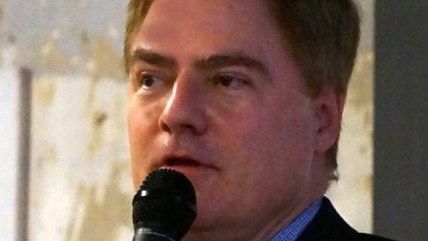Gay Gun Rights Activist: Arm Yourselves
An important Supreme Court decision on the right to self-defense involved the fear of anti-LGBT violence.


The New York Daily News has used the Orlando attack (as have many, many others) to continue its call for stricter gun controls and to blame the National Rifle Association (NRA), in spite of America's lengthy history of being completely unable to ban access to any product or good its citizens want to get their hands on.
But despite their tunnel vision, let's give credit to them for giving space for a strong opposing opinion. Today they've also got a piece by noted gay, libertarian, gun rights advocate Tom G. Palmer, calling for LGBT citizens to arm themselves. He writes:
Let's get one thing very clear. Gun control advocates disarmed the victims at that night club. Florida law states unequivocally that even a concealed carry permit "does not authorize any person to openly carry a handgun or carry a concealed weapon or firearm into any portion of an establishment licensed to dispense alcoholic beverages for consumption on the premises, which portion of the establishment is primarily devoted to such purpose."
That made those people sitting ducks. Legally designated gun-free zones are invitations to killers. They get to rack up kills among defenseless victims without any effective opposition. There is a reason that they seek out such places: Everyone has been disarmed and rendered defenseless by the gun-control movement.
Advocates of gun control think it's a good idea to disarm victims and to advertise where you can find completely defenseless people because there's one primitive magical superstition they share with the murderer Omar Mateen: chanting things makes them true. If you chant the right words, in this case "Guns are forbidden," no one will have guns. And if no one has guns, there will be no murders.
Palmer isn't just a supporter of gun rights, he helped fight to secure them. Palmer was one of the plaintiffs of the important District of Columbia v. Heller Supreme Court decision. That was one of the Supreme Court decisions that helped establish that the Second Amendment right to self-defense is, indeed, an individual right.
Palmer fought for gun rights on the basis of being able to protect himself from the likes of Orlando killer Omar Mateen. He had previously used a gun in California to scare off a pack of men who threatened him with apparent antigay animus. But D.C. laws prohibited from similarly defending himself (and others) there.
The call for more gun control here is as predictable as it is rather baffling. For one, there is no prohibition in the United States that actually works. And while there's increasing evidence that Mateen was likely a dirtbag even before ISIS came around to use an excuse to wreak the mayhem he probably always fantasized about, it's just not clear that he ever would have been affected by tighter gun regulations—that is, unless we started using mere suspicion as an excuse to curtail liberties, which some have been promoting. It's as much of a constitutional violation as proposed "hate speech" restrictions and will likely have the same unintended consequences. We would have no control over who the government prosecutes or who the government denies gun rights. Keep in mind Mateen worked as a security guard with government contracts. Many gun restrictions have exemptions for those who work in law enforcement.
What we do know is that clearly relying on the government domestic surveillance system to prevent attacks failed here just as it failed in San Bernardino. So many responses to this sort of violence seem to a call for a sort of collective action that's already been shown to be unsuccessful. Think all Muslims should be under surveillance? Well, Mateen was investigated a couple of times by the FBI, who apparently did not conclude he was a threat. Think there should be collectively tighter gun controls? Have we forgotten Bataclan already? Go ahead and forget France, then—many of the same people calling for tighter gun laws already understand that prohibition against drugs are a massive failure that have done little but throw more people in prison. Prohibitions don't work.
How could some sort of collective government response be successful to such a decentralized domestic threat? How is it reasonable to expect that the same government that failed to predict Mateen's behavior (and to be clear, I'm not saying that it was even possible to know that this was coming) to be able to immediately mobilize and protect us at the drop of a pin?
It's becoming increasingly clear that the Orlando Police certainly tried in this case. The latest details have police rushing into the club early on to confront Mateen, leading to a firefight, followed by a hostage scenario. Now we can dread the possibility that some people might have been killed by police gunfire by accident. But that's the argument that gun control advocates use against individual ownership—self-defense in public encounters might not work, and innocents could get hurt or killed. If the same thing happens when police respond to mass shootings, and it's not reasonable to expect safer outcomes when the government gets involved, then all people are doing is rendering themselves utterly, bafflingly helpless. What happened wasn't a failure of gun control. It's exactly what an outcome of gun control looks like that advocates just refuse to accept as an unintended consequence.
People can decide that they don't want to arm themselves. And the bar owner should be able to decide whether to allow armed patrons or not. But people should not be able to make that decision for others. That was exactly Palmer's crusade. He should not have to hope that somebody with a badge shows up with guns blazing to protect him in time. None of us should. It's not a realistic expectation of government.
Palmer is hardly alone in wanting to defend himself against anti-gay attacks. Check out the Pink Pistols.


Show Comments (263)